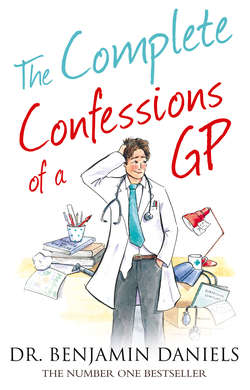Читать книгу The Complete Confessions of a GP - Benjamin Daniels - Страница 45
Mrs Briggs
ОглавлениеIt is 3 a.m. on a Sunday night and I’m working on call for the ‘out-of-hours’ doctors. I get a call through to do an emergency visit. Before I arrive, I have only minimal information about what to expect. All I know is that I’m visiting Mrs Briggs who is in her seventies and has breast cancer.
When I arrive, five or six family members greet me at the door. I’m ushered upstairs in hushed silence and shown into a dimly lit bedroom. In front of me lies a skeleton of a woman. Pale and semi-conscious, she is quite clearly dying. In my years as a doctor I’ve seen many people die. In hospital it is all quite clinical. It is easier to think of them as the ‘stroke’ in bed 3 or the ‘lung cancer’ in cubicle 2, rather than as a real person. In the patient’s own home it is less easy to protect yourself from the enormity of somebody’s death. Surrounded by belongings and pictures of them looking healthy and contented during happier times, the dying person feels overwhelmingly real.
The daughter explains to me that her mum’s wish is to die at home and the family is determined to keep her out of hospital or hospice. Up until now she had been managing fairly well, drinking small amounts and her pain was well controlled with tablets. Unfortunately, over the course of the evening she had deteriorated quite rapidly and she was now agitated and seemed to be in pain. She was writhing around the bed and crying out. With end stage cancer, it is very unpredictable as to how and when someone will actually die. With heart attacks, it is easy to understand. The heart ceases being supplied with blood and oxygen so it stops and that’s it. A slow-growing tumour that spreads and eats you away from the inside makes you weak and frail but it is difficult to know exactly how and when it will finally kill you. I couldn’t be sure exactly what it was that was going to end Mrs Briggs’s life, but there was no doubt in my mind that she was going to die tonight.
One of the principal aims of palliative care is to keep the patient pain free until the end. Mrs Briggs was only semi-conscious and couldn’t answer my questions. I couldn’t be sure of exactly how aware she herself was of the pain, but she was certainly agitated and appeared distressed and I couldn’t leave her like this. It was also very upsetting for her family and they were desperate for me to do something. Mrs Briggs couldn’t take anything orally so I was going to need to give her an injection of something and that something was morphine. Since Harold Shipman, GPs have been extremely nervous about using morphine in this way. Dr Shipman used injections of morphine to kill his patients and so, understandably, my decision to inject a syringe of the stuff into Mrs Briggs wasn’t one to be taken lightly, especially as I knew that she could potentially die quite quickly as a result.
In an ideal world I would set up a syringe driver, which is a pump that slowly injects morphine automatically into the patient until the pain is controlled. But it was 3 a.m. and Mrs Briggs needed pain relief now. There was no way that I was going to be able to organise a syringe driver tonight. I took the family aside and explained that I wanted to give her an injection of morphine. I explained that it might decrease her level of consciousness but would ease the pain and agitation. The family was well aware that she only had a few hours left and they wanted them to be peaceful and pain free. They were happy for me to give the injection. I drew up the morphine into my syringe and slowly injected the clear fluid under her skin. In front of my eyes, her tense agitated body relaxed. I only gave her a few mils, but she had so little flesh on her that she didn’t need much for it to take effect. As Mrs Briggs’s writhing body calmed, so did the torment on the faces of her family. Her breathing became shallow and she slipped into a deep coma and died a few hours later.
Her family was immensely grateful. It wasn’t euthanasia, but perhaps my injection of morphine sped up her death by a few hours. Many of my day-to-day actions as a GP lead me to question the ethics of the choices I make. However, I never doubted that my decision to give Mrs Briggs morphine that night was the right thing to do. My fears about giving morphine are more about the family and how they might react. If I had thought that the family wasn’t on my side, I wouldn’t have given the morphine. Not because the wishes of the family are more important than the wellbeing of the patient, but because I wouldn’t want to have to defend my actions in court. Mrs Briggs would have suffered but I’m not prepared to be labelled as the ‘next Shipman’. People accuse doctors of playing God by choosing when patients live or die and sometimes we do, but as long as our decisions are made with compassion and not arrogance, I’ll make no apologies.
